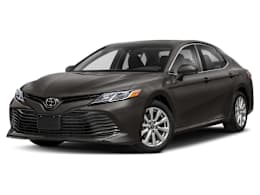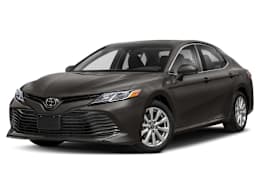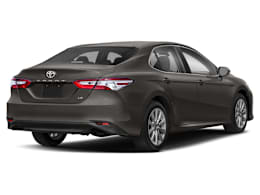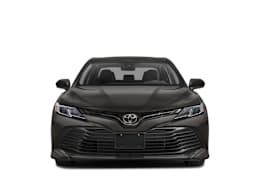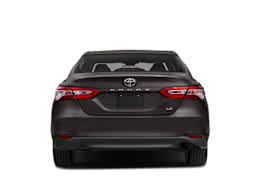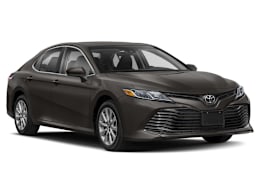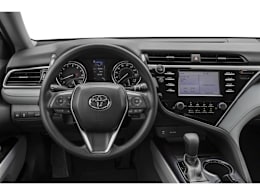The new Camry offers sleeker styling, but it's the improved fuel economy and handling, plus standard advanced safety systems, that distinguish it among the crowd of midsized sedans.
The Camry has long held the distinction as a competent, well-rounded and pleasant family sedan. However, it gets a bad rap among critics as unexciting. To address that perception, the redesign brings snazzier styling and slightly nimbler handling. The end result is mixed, but the Camry remains a competitive midsized sedan.
Based on an all-new global platform shared with the C-HR and Prius, the eighth-generation Camry is lighter on its feet in the corners, but the lower stance compromises access to the cabin.
A smooth and comfortable ride has always been a Camry strength, and this remains true even with the car's improved agility. The suspension soaks up bumps easily and delivers a pleasant ride.
Fuel-economy gains come courtesy of a 203-horsepower, four-cylinder engine combined with a new eight-speed automatic transmission. The Camry achieved 32 mpg overall, equaling its much smaller Corolla cousin. This base engine makes the Camry one of the quickest sedans in its class. The new eight-speed transmission suffers from some rough shifts, however, something the hybrid -- which gets a CVT -- does not suffer from. While quiet overall, the engine's vroom when it approaches 3,500 rpm sounds loud, raspy and excessive. Again, in this case, the hybrid is quieter.
The hybrid LE version (which we also tested) is even more astounding with 47 mpg overall. It's worth noting the SE and XLE trims of the hybrid use a different battery technology than our tested LE, and likely won't be as frugal.
For those needing more oomph (and tranquility), there's also a reworked 3.5-liter V6 packing 301 hp.
The Camry's redesigned cabin comes with very decent visibility, thanks to slim pillars and lots of side glass. Drivers get a wide, nicely padded front seat that delivers plenty of support for a long cruise.
However, the new Camry is less upright than the outgoing car, so slipping into the seats requires a little more ducking, and headroom is a bit tight for taller folks, especially if the car is fitted with the optional sunroof. The rear seat isn't as roomy as the last generation either, but at least those in back get reasonable head- and legroom.
The interior has a modern vibe, courtesy of the angular center stack layout and its clean design. All Camrys come with Toyota's Entune 3.0 infotainment system.
A 7-inch touch screen is standard, and an 8-inch version is available on higher trims. Controls are easy to use. We appreciate the physical knobs for audio volume and tuning. Non-hybrid LE versions have a basic climate control system which strikes us as cheap. Again, advantage: hybrid.
Overall interior presence has improved, with more soft-touch surfaces, although some hard plastic bits remain scattered throughout.
All Camrys come standard with Toyota Safety Sense-P, which includes forward collision warning and automatic emergency braking -- an approach we applaud. Pedestrian detection and lane departure warning with steering assist are also included. Blind spot warning and rear cross traffic warning are available .
The Camry has long been known for its tremendous reliability and strong resale value. Ultimately, the familiar Camry virtues are again on display, although packaged with a more youthful flair.



